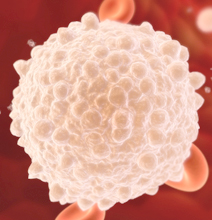Personalized medicine
KRAS AND BRAF MUTATIONS
Knowing what mutations are present (or absent) in your tumor helps to find the most effective chemotherapeutic drugs against it. To determine this, a sample of the tumor is analyzed in a pathology laboratory.
This analysis can be vital; for example, we know that colon cancer with some mutations in the KRAS genes does not respond to the chemotherapeutic drugs panitumumab and cetuximab.
This because the Kras gene produces a signaling protein that binds and activates EGFR, stimulating the growth and multiplication of the tumor cell. However, in patients with some Kras mutations – present in about 4 out of 10 colorectal cancers - the molecule produced by Kras works autonomously, with no need of EGFR. This means that targeted therapies that block EGFR will be ineffective in these patients. So neither cetuximab (Erbitux®) nor panitumumab (Vectibix®) should be used to treat them.
The same occurs in patients with mutations in the BRAF gene (usually the V600E mutation), which account for about 5-10% of colorectal tumors. Therefore, these patients with KRAS and BRAF mutations need to be treated with different drugs.





